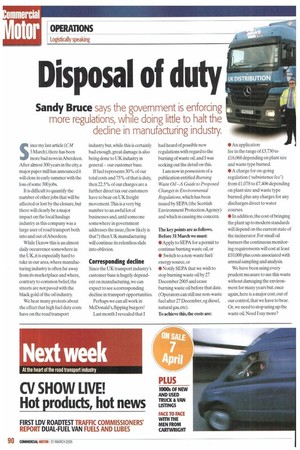Disposal of duty
Page 92

If you've noticed an error in this article please click here to report it so we can fix it.
Sandy Bruce says the government is enforcing more regulations, while doing lithe to halt the decline in manufacturing industry.
Since my last article (CM 3 March), there has been more bad news inAberdeen. After almost 300 years in the city, a major paper mill has announced it will close in early summer with the loss of some 300 jobs.
It is difficult to quantify the number of other jobs that will be affected or lost by the closure, but there will clearly be a major impact on the local haulage industry as this company was a large user of road transport both into and out of Aberdeen.
While I know this is an almost daily occurrence somewhere in the UK, it is especially hard to take in our area, where manufacturing industry is often far away from its marketplace and where, contrary to common belief, the streets are not paved with the black gold of the oil industry We hear many protests about the effect that high fuel duty costs have on the road transport industry but, while this is certainly bad enough, great damage is also being done to UK industry in general our customer base.
If fuel represents 30% of our total costs and 75% of that is duty, then 22.5% of our charges are a further direct tax our customers have to bear on UK freight movement.This is a very big number to an awful lot of businesses and,until someone somewhere in government addresses the issue, (how likely is that?) then UK manufacturing will continue its relentless slide into oblivion.
Corresponding decline
Since the UK transport industry's customer base is hugely dependent on manufacturing, we can expect to see a corresponding decline in transport opportunities.
Perhaps we can all work in McDonald's, flipping burgers!
Last month revealed that I had heard of possible new regulations with regard to the burning of waste oil, and I was seeking out the detail on this.
I am now in possession of a publication entitled Burning Waste Oil-A Guide to Proposed Changes in Environmental Regulations, which has been issued by SEPA (the Scottish Environment Protection Agency) and which is causing me concern.
The key points are as follows. Before 31 March we must • Apply to SEPA for a permit to continue burning waste oil, or • Switch to a non-waste fuel/ energy source, or • Notify SEPA that we wish to stop burning waste oil by 27 December 2005 and cease burning waste oil before that date. (Operators can still use non-waste fuel after 27 December, eg diesel, natural gas, etc).
To achieve this, the costs are: • An application fee in the range of £3,730 to £16,068 depending on plant size and waste type burned.
• A charge for on-going regulation ('subsistence fee') from £1,078 to £7,406 depending on plant size and waste type burned, plus any charges for any discharges direct to water courses.
• In addition, the cost of bringing the plant up to modern standards will depend on the current state of the incinerator. For small oil burners the continuous monitoring requirements will cost at least £10,000 plus costs associated with annual sampling and analysis.
We have been using every prudent measure to use this waste without damaging the environment for many years but, once again, here is a major cost,out of our control, that we have to bear. Or. we need to stop using up the waste oil. Need I say more?






















































































































































































































